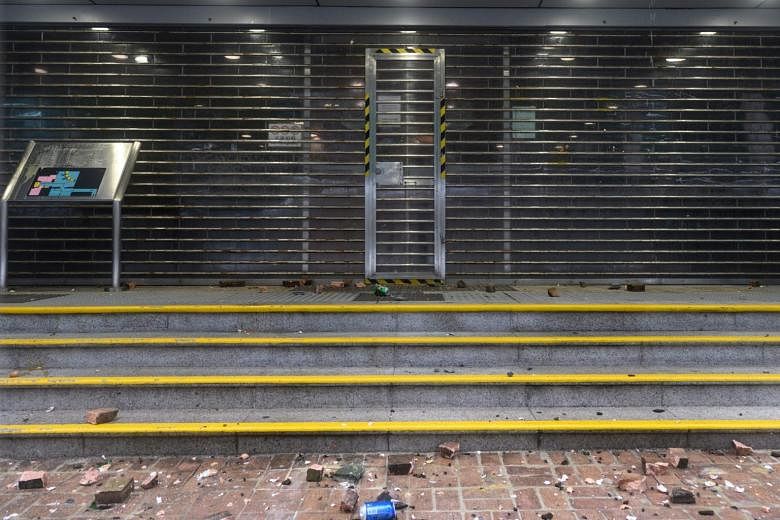HONG KONG (AFP) - In one peaceful community previously untouched by the months of unrest that have shaken Hong Kong, it was an unexpected sight: the methodical ransacking of the local subway station over a three-hour period.
Clashes raged in multiple locations throughout the former British colony on Friday night (Oct 4) after Hong Kong's leader Carrie Lam invoked colonial-era emergency powers to ban pro-democracy protesters wearing face masks.
Police used tear gas to disperse protesters who had taken over roads, vandalised subway stations, set street fires and trashed pro-China businesses - testing again the capacity of the city's law enforcement, who many accuse of using excessive force.
Around 8.30pm on Friday, it was the turn of Tseung Kwan O, which sits across a bay from the main island of Hong Kong.
For three hours, not one police officer was visible in the district, which is popular with Westerners.
'LIKE A QUEEN'
The demonstrators had all the time in the world to ransack the local station run by the MTR Corp, the company operating the city's underground rail system, which the protesters accuse of siding with the pro-Beijing government.
"MTR supports the government by closing stations on purpose to prevent demonstrators moving around," said one student, 19, who identified himself only as JC.
"But they help transport the police," he said, as rail services were suspended throughout the semi-autonomous territory's network.
"Banning masks doesn't change anything," added JC, hiding his own face - like other protesters - to avoid being identified for prosecution.
Tape covers his fingertips so he leaves no prints.
"The main problem is that she goes through the law without the LegCo," JC continued, referring to Hong Kong Chief Executive Carrie Lam, who was appointed by an overwhelmingly Beijing-friendly committee.
Under sweeping powers unveiled on Friday, Mrs Lam does not need the approval of the city's legislature, known as LegCo, to introduce laws.
"She's like a queen now," JC said.
As in many of Hong Kong's New Towns, the subway station is the nerve centre of local life.
Graffiti at the entrance read: "Communist railway."
Inside, fire hoses were unwound and water flowed down escalators leading to train platforms.
The sprinklers were activated too, and the floor flooded as loudspeakers blared an automated message about the "emergency", telling people to leave immediately.
Outside, armed with metal barriers, protesters systematically broke each pane of glass along a 200m facade.
'UPPING OUR GAME'
"What happened wasn't planned," Nathalie, a 32-year-old worker, said enthusiastically, hailing the movement's ability to mobilise through social networks.
"That's the most impressive part of the movement. Everything was triggered by the press conference" at which Mrs Lam announced the mask ban, Nathalie adds.
"The government doesn't listen to us. So we are upping our game."
By 11.30pm, six vans arrived near an intersection beside the MTR station where hundreds of protesters had erected small makeshift barricades.
About 20 riot police finally appeared. The protesters pulled back and JC changed from his black jacket - the colour of clothing favoured by protesters - into something in a less conspicuous shade.
Then he melted away.
A shirtless man, cigarette in his mouth and beer in hand, walked to the middle of the junction to challenge the officers, much to the approval of the demonstrators.
Then he backed down.
By 11.45pm, more than three hours after it all began, the police got back in their vans and headed off.
Protesters let out cries of joy, then very quickly dispersed, leaving the residents of Tseung Kwan O to pick up the pieces.










